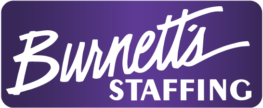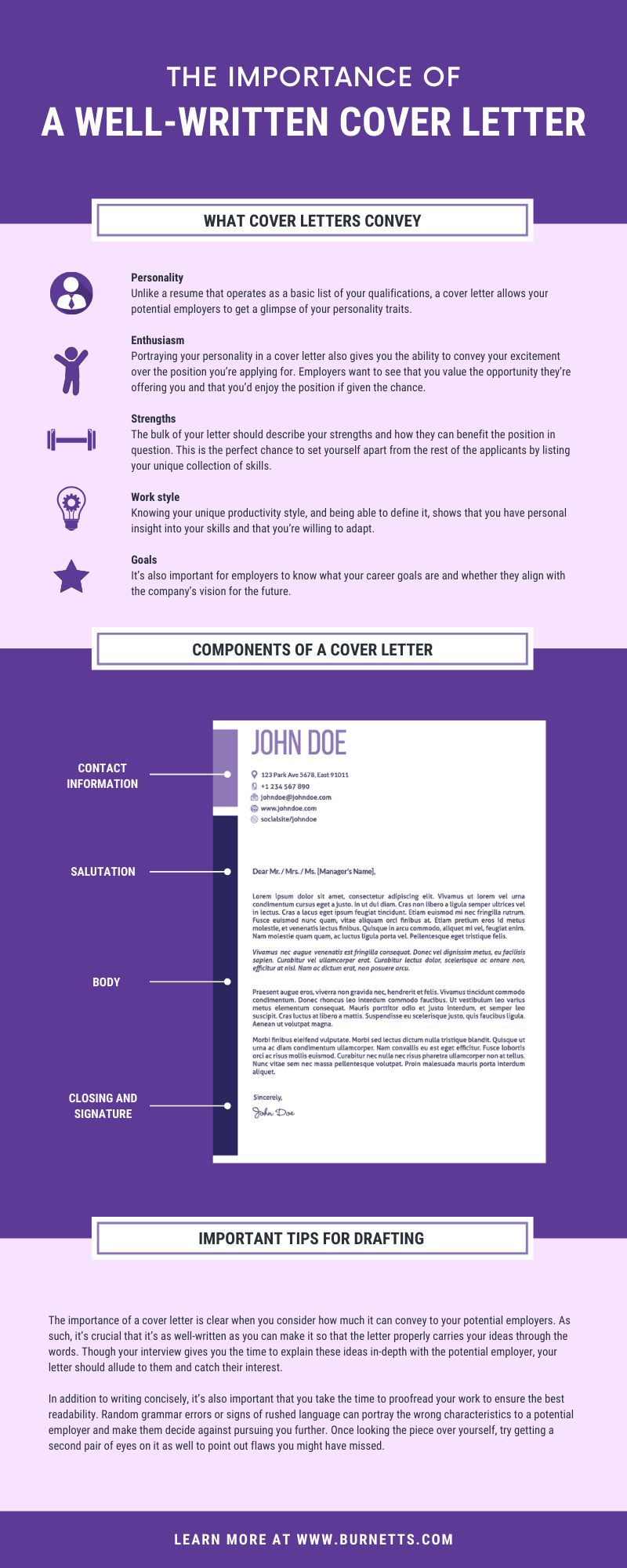When you’re in the process of applying for a job, most of your efforts often go into developing a sold resume and practicing for interviews. However, there’s another application tool that’s essential to have in your arsenal—a well-written cover letter. These letters are a more detailed version of your resume and often provide more insight into your work ethic and if you’re a good fit for the role. So, before you begin your job search, take this chance to learn the importance of a cover letter and how to formulate an effective one.
What Cover Letters Convey
Writing a cover letter, along with your resume, gives you additional opportunities to provide details about your experiences and expectations. As such, employers value cover letters because they provide them with this insight. You get to demonstrate your personal traits in your letter and customize it to appeal to the specific job and company you’re applying to. The following are some of the other things that a cover letter conveys:
Personality
Unlike a resume that operates as a basic list of your qualifications, a cover letter allows your potential employers to get a glimpse of your personality traits. The words that you use to describe your excitement can portray some of your core characteristics and values. This aspect will give your potential employer an idea of whether you’ll fit into the company culture.
Enthusiasm
Portraying your personality in a cover letter also gives you the ability to convey your excitement over the position you’re applying for. Employers want to see that you value the opportunity they’re offering you and that you’d enjoy the position if given the chance. As such, it’s crucial that you demonstrate having researched the company and its values.
Strengths
The bulk of your letter should describe your strengths and how they can benefit the position in question. This part is the perfect chance to set yourself apart from the rest of the applicants by listing your unique collection of skills. Then, once you establish those skills, you can demonstrate how your knowledge fits the employer’s specific needs.
Work style
While you’re describing your strengths, it’s also important to talk about your work style and how you best process information. Employers want to know this information because it gives them an understanding of how you’ll best perform on the job. Knowing your unique productivity style, and being able to define it, shows that you have personal insight into your skills and that you’re willing to adapt.
Goals
It’s also important for employers to know what your career goals are and whether they align with the company’s vision for the future. As such, your cover letter needs to list your professional goals in a way that shows you want to grow with the company and contribute to their success. Including your goals will also tell them that you’re interested in internal growth rather than leaving after a short period to pursue other interests.
Components of a Cover Letter
With ample amounts of information to include in your cover letter, you’d think that it could be several pages. However, these pieces are (at most) about a page to ensure they’re concise and to the point. Because of this, you’ll need to include these vital sections of the letter in a balanced way.
Contact information
Like your resume, the header of your cover letter should include a section for your contact information unless specified otherwise. This way, the interviewer can see all your necessary information right away and at a glance. Be sure that this part of the letter contains your name, address, phone number, email address, and your networking profile.
Salutation
Writing an appropriate salutation often requires you to do a bit of research into the company and who will be reading your letter. Using generic phrases like “to whom it may concern” can create a disconnect between you and your potential interviewer and make your following enthusiastic language seem ungenuine. For the best effect, it’s ideal that you use the person’s name as this establishes a connection.
Body
The body is the section where you explain what you have to offer the employer and why you’re interested in the position. Depending on the detail you decide to go into, this part of the letter can be as long as four paragraphs—as long as it doesn’t go over the page. If you fear it might be too long, remember to go back and cut down some of your long sentences. This section is also where you’ll exemplify most of your personal writing style, so it’s important that you structure the letter to cater to the job.
Closing and Signature
When closing a cover letter, it’s imperative that you remain professional. Steer clear of any personalized phrases such as “cheers” or “best” to avoid coming across as too informal. Instead, it’s often best to play it safe with closings such as “sincerely” or “yours truly.” Once complete, sign your name to officiate the document.
Important Tips for Drafting
The importance of a cover letter is clear when you consider how much it can convey to potential employers. As such, it’s crucial that it’s as well-written as you can make it so that the letter properly carries your ideas through the words. Though your interview gives you the time to explain these ideas in-depth with the potential employer, your letter should allude to them and catch their interest.
In addition to writing concisely, it’s also important that you take the time to proofread your work to ensure the best readability. Random grammar errors or signs of rushed language can portray the wrong characteristics to a potential employer and make them decide against pursuing you further. Once looking the piece over yourself, try getting a second pair of eyes on it as well to point out flaws you might have missed
Though only a page each, your cover letter and resume are the first interactions that a potential employer will have with your qualifications. At Burnett’s Staffing, we understand just how important these tools are to get your foot in the door. Our staffing agency in Plano, Texas, is here to help you develop your professional presentation so your career opportunities can grow.



